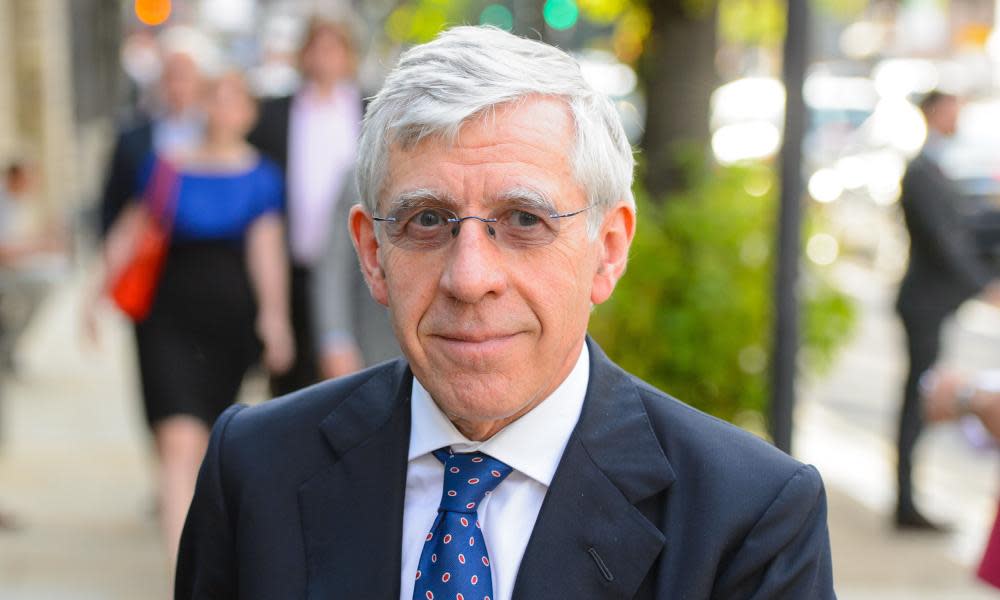Rendition case against Jack Straw must be held in secret, judge rules

The high court should sit in secret when the former foreign secretary Jack Straw faces a damages claim over his alleged role in the abduction and torture of a Libyan dissident and his pregnant wife, a ruling has said.
Having failed in a previous attempt to have the case against Straw struck out, government lawyers successfully sought to have it heard behind closed doors under controversial new justice measures.
Friday’s judgment paves the way for the trial to be held in secret, and means the alleged torture victims, the media and their lawyers can all expect to be excluded for some of the trial.
The current foreign secretary, Boris Johnson, signed the application that has been made to the high court, the Guardian reported last month.
Straw is a defendant in the case alongside Sir Mark Allen, a former senior MI6 officer, MI6 itself, MI5, and the Foreign Office.
The case is being brought by Abdel Hakim Belhaj and his wife Fatima Bouchar, who were detained in Bangkok in March 2004 following a tipoff from MI6, and flown to Tripoli against their will in a so-called extraordinary rendition operation.
They opposed the government’s request for a secret trial under section 6 of the Justice and Security Act on the basis that extensive evidence of the CIA torture programme – and of their abduction – has been in the public domain for years.
Mr Justice Popplewell, the judge dealing with the case, found that “despite the weight and cogency” of the claimants’ evidence, he concluded that disclosure of the government’s material “would cause significant damage to the interests of national security … irrespective of the current sensitivity of the intelligence itself.”
He further observed that it was “very unlikely that the [defendants’ sensitive] material” could be put into an open court or made available to the Belhaj family or their legal representatives.
Lawyers for Belhaj and Bouchar argued that many of the key facts in the case and of the CIA rendition programme in general were officially confirmed.
These include the CIA’s use of specific torture techniques on its prisoners; its use of a black site in Thailand; and its use of the specific rendition jet N313P to take Belhaj and his pregnant wife to Muammar Gaddafi’s Libya.
The Metropolitan police have confirmed that Allen was the suspect investigated for his role in the renditions and recommended criminal charges.
Following the ruling, Belhaj said: “I went through a secret trial once before, in Gaddafi’s Libya. It took about a half hour, and I never saw any of the evidence against me. Later a guard came to my cell and tossed in a red jumpsuit – that was how I found out that the secret court had sentenced me to die.
“Fatima and I have stuck with this case for all these years because we believe the British system, unlike Gaddafi’s, can deliver justice. But what kind of a trial will it be if we put in a mountain of evidence and government officials can simply refuse to answer us?”
Sapna Malik, a partner at Leigh Day who represents the Belhaj family, said she hoped the judge would reconsider his decision.
“Despite the wealth of material in our clients’ possession we will now enter the Kafkaesque world of ‘closed defences’ and covert evidence, with the prospect of a secret trial, from which our clients will be excluded and unable to fully test the defendants’ case,” she said.
Cori Crider, a lawyer at the human rights charity Reprieve, which is supporting the case, said: “We’re disappointed that there has been no effort to engage with extensive evidence that has been in the public domain for years.”
Documents discovered in Tripoli during the 2011 Libyan revolution include a fax from Allen to Gaddafi’s intelligence chief, Moussa Koussa, in which Allen took credit for sharing the information that enabled the couple to be abducted.
Other papers appear to show the operation was the culmination of more than two years of cooperation between MI6 and Gaddafi’s external security organisation.
Belhaj and Bouchar have since described how masked CIA officers detained them at Bangkok airport, strapped them to stretchers and placed them aboard an aircraft that flew them to Tripoli.
Bouchar, a Moroccan national, was imprisoned for five months and released shortly before giving birth to a son.
Her husband, who was the leader of an anti-Gaddafi force, the Libyan Islamic Fighting Group (LIFG), was held for six years and says he was repeatedly tortured.
Belhaj was also interrogated by British intelligence officers. He says that when he silently indicated to these officers that he was being tortured, one, a woman, nodded, while her male companion gave a thumbs-up signal.
The couple are suing for damages for what they say was the defendants’ involvement in their abduction, false imprisonment and mistreatment, and misfeasance in public office.
Their lawyers argue that as Straw was the government minister responsible for MI6 at that time, he either authorised the rendition operation or took no steps to prevent it.
They also say there is clear documentary evidence that Allen led MI6’s contacts with the Libyan government and was the senior MI6 officer with responsibility for the rendition operation.
Straw has said he was opposed to extraordinary rendition, was not complicit in it and did not turn a blind eye to it. Allen has declined to comment publicly.

 Yahoo News
Yahoo News 
